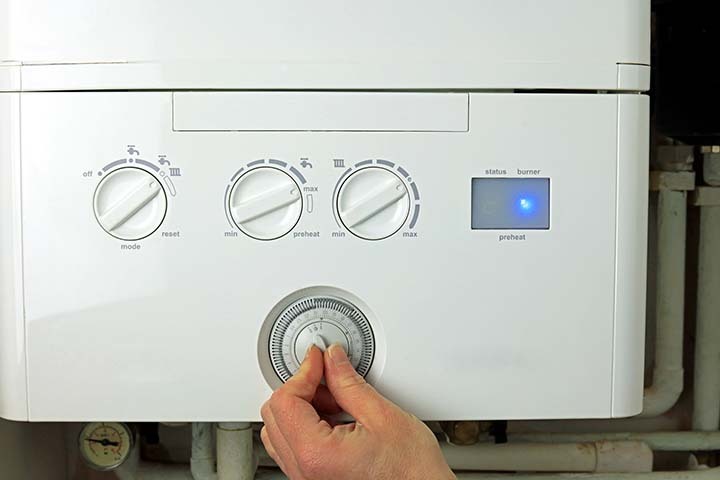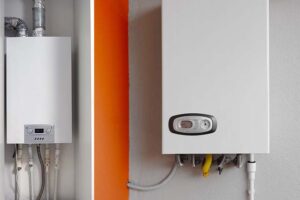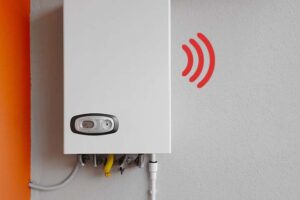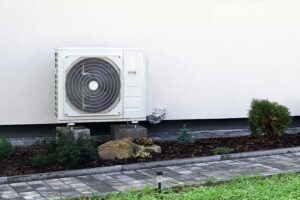By any chance, if you own an off-gas home, and are looking to upgrade your heating system. You should know electric combi boilers are a mainstream alternative for small-to-medium UK homes. These handy electric combi boilers aim to replace gas while keeping installation simple and compact. The flue, the gas supply, and the gas-safety structure are all taken out and the whole system is replaced with mains electricity and a heat exchanger.
This guide is all about the electric combi boilers – what they really are, how they work, their prices, installation, advantages, and disadvantages. Therefore, if you think about switching your heating system to an electric one, reading this guide will certainly be of great help to you.
What Is an Electric Combi Boiler and How Does It Work?
Electric combi boilers use the electricity from the main source to heat both the central heating and the domestic hot water at the same time. It doesn’t need a flue, gas, or hot water cylinder for heating and hot water in the house.
As soon as the hot faucet is turned on, the boiler moves the electric heating to the domestic circuit to give hot water. If the temperature is lower than what is set by the thermostat, the power will be sent to the radiators.
Key functional advantages of Electric Combi Boiler:
- It provides Instant hot water with no cylinder or stored hot water heat loss.
- It is wall-mounted, freeing space previously used by a flue or boiler cupboard.
All these advantages of an electric boiler make installing one a smart decision, particularly in off-gas areas.
How Much Does It Cost to Buy and Install One in 2025?
Typically, base purchase costs of electric combis are cheaper than high-end gas combis. Yet, overall installed costs are a function of electrical upgrade requirements. Normal UK home installation costs range are approximately £1,500–£4,500 for simple jobs.
| Item | Typical low | Typical high | Notes |
| Unit cost (compact electric combi) | £600 | £1,800 | Brand and capacity dependent |
| Basic install (no electrical upgrade) | £900 | £2,000 | Labour, plumbing, commissioning |
| Electrical upgrade (consumer unit/fuse/cable) | £500 | £2,000+ | Major driver if a three-phase or larger fuse needed |
| Total typical install | £1,500 | £4,500+ | Complex upgrades increase cost |
Before you make a budget, you should get a qualified site survey focusing on electrical capacity.
Costs & Running Expenses (Most Recent 2025)
Electric combi boilers have an efficiency of practically 100% at the point of use. However, their running cost per kWh is more than natural gas and directly depends on consumption in the household.
Hence, there is only one way an electric combi outperforms gas in terms of cost, i.e., with little off-peak tariff usage, or on-site solar PV with storage.
The maths is simple: cost per kWh × kWh used for heating + hot water.
Comparing the Costs:
- Step 1: The first step is to establish the annual heating requirement in kWh (for an average small, well-insulated house it is about 6,000-10,000 kWh/year; more for larger houses).
- Step 2: Then multiply the number of kWh by the unit cost (electricity vs gas) — don’t forget to include standing charges.
- Step 3: Include a hot-water fraction (a combi on-demand minimises stored heat losses).
It can recover changes in benefit towards the electric combi.
Is running a cheaper option than gas or oil boilers?
Normally not, per-kWh electricity costs are higher than gas and oil on a delivered-energy basis.
So, electric combis will usually be more expensive to run for the same amount of heat. All buyers have to face that reality check, except in the case when the household uses cheap or self-generated electricity.
When electricity is cheaper:
- You have battery+solar PV that meets the majority of heating and hot-water requirements.
- You can shift most heating to extremely low-cost off-peak power (some time-of-use rates).
- Your heat requirement is very modest, and gas hookup fees or upkeep drive gas out of the tolerable total cost.
Otherwise, a heat pump or a gas will typically be more economical on utility bills.
Pros & Cons of Using Electric Combi Boilers for Heating
Electric boilers provide great advantages regarding simplicity, safety, and installation time. Still, it is running-cost exposure and maximum heat output for large homes where the system loses. The pros are structural and the cons are economic and capacity-related. Take a look at the trade-offs and see where your property fits into that picture.
Pros
- No flue, no gas pipe, no carbon-monoxide risk.
- Usually smaller than gas combis and ideal for flats.
- Fewer moving parts than complex gas boilers (less annual servicing friction).
- All electrical input becomes heat in the home.
Cons
- Usually, electricity costs more than gas/oil.
- Standard models are generally made for small-to-medium houses. However, households with high demand or multi-bath rooms might require more than one unit or extra heating.
- Unless paired with renewables, emissions and costs track the electricity mix and market.
- Mains upgrades can kill the economics.
An electric combi is a smart choice regarding the user’s intention for the minimum installation friction plus future-proofing. In case the goal is the lowest annual running costs for a large house, then alternatives should be considered.
Can an Electric Combi Heat Large Homes?
Not that well, electric combis are designed for small-to-medium houses. The demand of larger houses with many bathrooms exceeds the output capacity of one electric combi.
Such homes will either need many electric units, large electric system boilers, or alternative heating like air-source heat pumps.
What Size Boiler Do I Need?
You should choose a capacity to satisfy your peak hot-water flow and your central-heating load. Typical small UK homes often use 6–9 kW electric combis, while larger properties may need 12–18 kW or multiple units. But the electrical supply may cap what is feasible.
| Home Size | Demand | Boiler Size |
| 1–2 bed flat | Low | 6–9 kW |
| 3 bed | typical family | 9–12 kW |
| 4+ bed or multi-bath | Large | 12–18 kW |
- Flow-rate estimate (l/min) for your peak hot-water needs.
- Heat-loss calculation for your property to determine the central heating kW requirement.
- Electrical service assessment to confirm your supply can handle the selected unit.
Do They Qualify for The Government Grants?
At times, electric combi boilers do not receive as much support as heat pumps. The main reason is that heat pumps can produce more heat per kWh which makes them the most efficient.
Before buying, make sure that you check for the available incentives (local authority grants, ECO/Free boiler schemes). If your objective is to achieve carbon-neutrality with financial assistance, you might discover that heat pump grants are often the most abundantly funded ones. Always verify with a certified installer and the local authority.
Conclusion
If the size of your property is small to medium, it is well insulated and you have either access to inexpensive electricity (time-of-use tariffs) or substantial on-site renewable generation, an electric combi boiler is then a convenient, low-friction, and low-maintenance option for quitting gas.
In contrast, if your main concern is the minimum running cost of a larger house, or you predict high simultaneous hot-water demand, then it’s time to consider heat pumps, hybrid systems, or gas (if available) as more economical options in the long run.
Frequently Asked Questions
Instant hot water + central heating from an electric element-driven combi; no flue, no gas.
Usually not, the electricity per kWh is typically higher; exceptions require cheap/self-generated electricity.
Do hydronic heaters’ sizing depend on peak hot-water flow and heat-loss calculations? 6-9 kW for small homes, 12-18 kW for larger ones is the typical range.
Look for current schemes; heat pumps often receive more robust support.
Select brands in the proper kW range with local service and warranty, confirm model specifications with product datasheets and installer.








